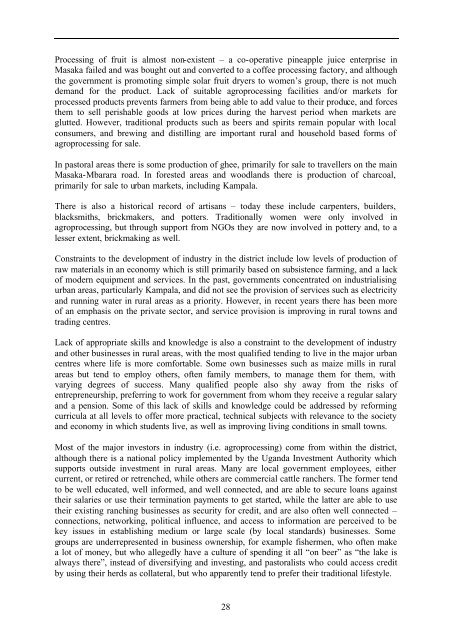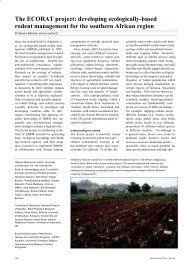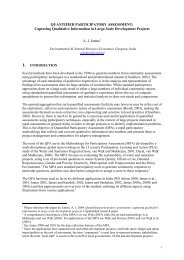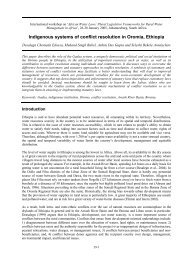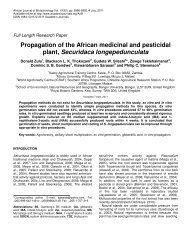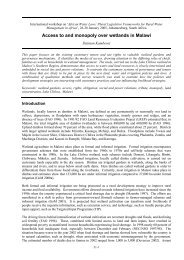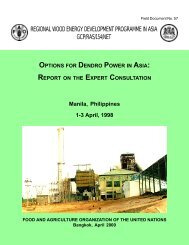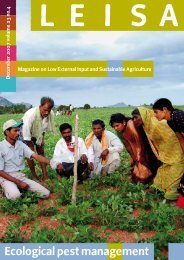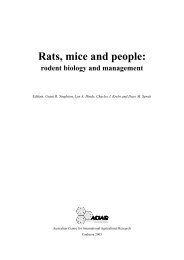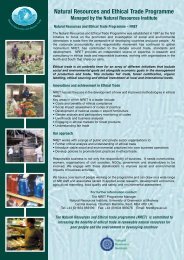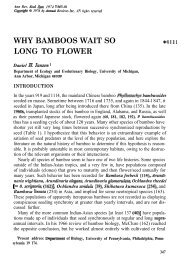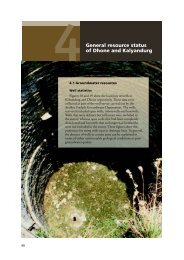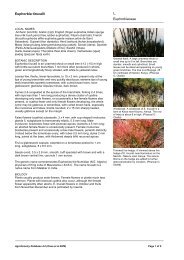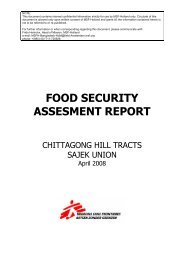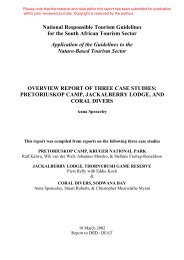Access to Rural Non-Farm Livelihoods - Natural Resources Institute
Access to Rural Non-Farm Livelihoods - Natural Resources Institute
Access to Rural Non-Farm Livelihoods - Natural Resources Institute
Create successful ePaper yourself
Turn your PDF publications into a flip-book with our unique Google optimized e-Paper software.
Processing of fruit is almost non-existent – a co-operative pineapple juice enterprise in<br />
Masaka failed and was bought out and converted <strong>to</strong> a coffee processing fac<strong>to</strong>ry, and although<br />
the government is promoting simple solar fruit dryers <strong>to</strong> women’s group, there is not much<br />
demand for the product. Lack of suitable agroprocessing facilities and/or markets for<br />
processed products prevents farmers from being able <strong>to</strong> add value <strong>to</strong> their produce, and forces<br />
them <strong>to</strong> sell perishable goods at low prices during the harvest period when markets are<br />
glutted. However, traditional products such as beers and spirits remain popular with local<br />
consumers, and brewing and distilling are important rural and household based forms of<br />
agroprocessing for sale.<br />
In pas<strong>to</strong>ral areas there is some production of ghee, primarily for sale <strong>to</strong> travellers on the main<br />
Masaka-Mbarara road. In forested areas and woodlands there is production of charcoal,<br />
primarily for sale <strong>to</strong> urban markets, including Kampala.<br />
There is also a his<strong>to</strong>rical record of artisans – <strong>to</strong>day these include carpenters, builders,<br />
blacksmiths, brickmakers, and potters. Traditionally women were only involved in<br />
agroprocessing, but through support from NGOs they are now involved in pottery and, <strong>to</strong> a<br />
lesser extent, brickmaking as well.<br />
Constraints <strong>to</strong> the development of industry in the district include low levels of production of<br />
raw materials in an economy which is still primarily based on subsistence farming, and a lack<br />
of modern equipment and services. In the past, governments concentrated on industrialising<br />
urban areas, particularly Kampala, and did not see the provision of services such as electricity<br />
and running water in rural areas as a priority. However, in recent years there has been more<br />
of an emphasis on the private sec<strong>to</strong>r, and service provision is improving in rural <strong>to</strong>wns and<br />
trading centres.<br />
Lack of appropriate skills and knowledge is also a constraint <strong>to</strong> the development of industry<br />
and other businesses in rural areas, with the most qualified tending <strong>to</strong> live in the major urban<br />
centres where life is more comfortable. Some own businesses such as maize mills in rural<br />
areas but tend <strong>to</strong> employ others, often family members, <strong>to</strong> manage them for them, with<br />
varying degrees of success. Many qualified people also shy away from the risks of<br />
entrepreneurship, preferring <strong>to</strong> work for government from whom they receive a regular salary<br />
and a pension. Some of this lack of skills and knowledge could be addressed by reforming<br />
curricula at all levels <strong>to</strong> offer more practical, technical subjects with relevance <strong>to</strong> the society<br />
and economy in which students live, as well as improving living conditions in small <strong>to</strong>wns.<br />
Most of the major inves<strong>to</strong>rs in industry (i.e. agroprocessing) come from within the district,<br />
although there is a national policy implemented by the Uganda Investment Authority which<br />
supports outside investment in rural areas. Many are local government employees, either<br />
current, or retired or retrenched, while others are commercial cattle ranchers. The former tend<br />
<strong>to</strong> be well educated, well informed, and well connected, and are able <strong>to</strong> secure loans against<br />
their salaries or use their termination payments <strong>to</strong> get started, while the latter are able <strong>to</strong> use<br />
their existing ranching businesses as security for credit, and are also often well connected –<br />
connections, networking, political influence, and access <strong>to</strong> information are perceived <strong>to</strong> be<br />
key issues in establishing medium or large scale (by local standards) businesses. Some<br />
groups are underrepresented in business ownership, for example fishermen, who often make<br />
a lot of money, but who allegedly have a culture of spending it all “on beer” as “the lake is<br />
always there”, instead of diversifying and investing, and pas<strong>to</strong>ralists who could access credit<br />
by using their herds as collateral, but who apparently tend <strong>to</strong> prefer their traditional lifestyle.<br />
28


